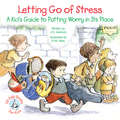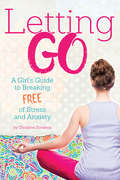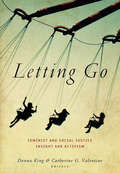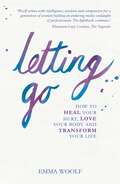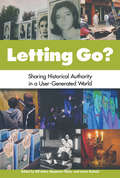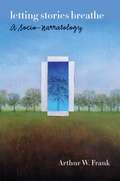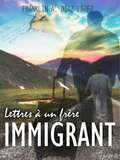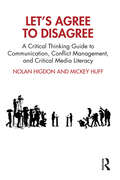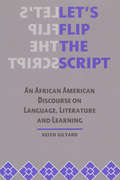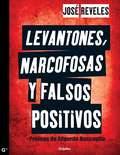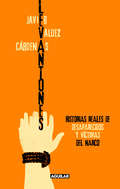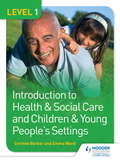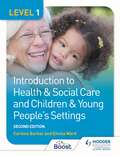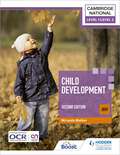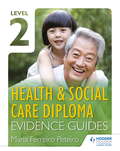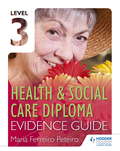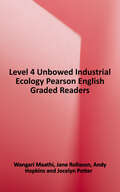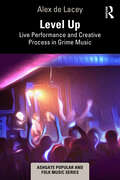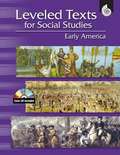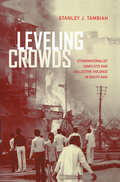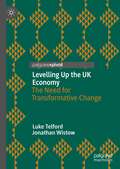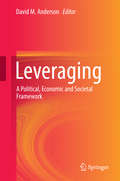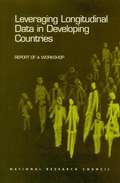- Table View
- List View
Letting Go of Stress
by R. W. Alley J. S. JacksonChildren aren't immune to stress. Kids are especially prone to feel fear before stressful events in their lives. Family, school, and team sports' schedules have been crammed into their daily activities so extensively that many children are robbed of their free recreational "growth" time, and an alarming number of kids are experiencing high levels of stress because of this. All of these realities can lead to our children having the same kinds of fears and concerns we adults have, especially about things they often have no control over. In this invaluable book, author J. S. Jackson helps children explore attitudes and ideas to try and diminish some of the stress they feel in their lives.
Letting Go: A Girl's Guide to Breaking Free of Stress and Anxiety
by Christine FonsecaDo you ever feel like you'll never be perfect? Do you worry that what you say or do or wear will be how people remember you? It's time to let go of those worries and embrace who you are. Letting Go: A Girl's Guide to Breaking Free of Stress and Anxiety has everything you need to help you understand and manage the very real pressures you're facing from life. Designed to provide strategies for managing stress and anxiety, this book is filled with practical evidence-based advice and stories from teen and young adult women like you who have found ways to manage their anxieties. Every chapter features a discussion of different types of stress and anxiety so you can understand better what you're experiencing, activities to help you remember all the things you love about yourself and to help you understand yourself better, strategies for combating both stress and anxiety, and a stories of other girls who've learned to move past their stress and love their lives— and themselves — to the fullest.
Letting Go: Feminist and Social Justice Insight and Activism
by Donna King Catherine G. ValentineAt a time when women are being exhorted to "lean in" and work harder to get ahead, Letting Go: Feminist and Social Justice Insight and Activism encourages both women and men to "let go" instead. The book explores alternatives to the belief that individual achievement, accumulation, and attention-seeking are the road to happiness and satisfaction in life. Letting go demands a radical recognition that the values, relationships, and structures of our neoliberal (competitive, striving, accumulating, consuming, exploiting, oppressive) society are harmful both on a personal level and, especially important, on a social and environmental level.There is a huge difference between letting go and "chilling out." In a lean-in society, self-care is promoted as something women and men should do to learn how to "relax" and find a comfortable work-life balance. By contrast, a feminist letting-go and its attendant self-care have the potential to be a radical act of awakening to social and environmental injustice and a call to activism.
Letting Go: Feminist and Social Justice Insight and Activism
by UnknownAt a time when women are being exhorted to "lean in" and work harder to get ahead, Letting Go: Feminist and Social Justice Insight and Activism encourages both women and men to "let go" instead. The book explores alternatives to the belief that individual achievement, accumulation, and attention-seeking are the road to happiness and satisfaction in life. Letting go demands a radical recognition that the values, relationships, and structures of our neoliberal (competitive, striving, accumulating, consuming, exploiting, oppressive) society are harmful both on a personal level and, especially important, on a social and environmental level. There is a huge difference between letting go and "chilling out." In a lean-in society, self-care is promoted as something women and men should do to learn how to "relax" and find a comfortable work-life balance. By contrast, a feminist letting-go and its attendant self-care have the potential to be a radical act of awakening to social and environmental injustice and a call to activism.
Letting Go: How to Heal Your Hurt, Love Your Body and Transform Your Life
by Emma WoolfExploring the issues of love, loss, healing and happiness, this manifesto for freedom from one of feminism’s liveliest voices will guide you on the path to feeling newly, truly confident.
Letting Go?: Sharing Historical Authority in a User-Generated World
by Bill Adair Benjamin Filene Laura KoloskiLetting Go? investigates path-breaking public history practices at a time when the traditional expertise of museums seems challenged at every turn-by the Web and digital media, by community-based programming, by new trends in oral history and by contemporary art. In this anthology of 19 thought pieces, case studies, conversations and commissioned art, almost 30 leading practitioners such as Michael Frisch, Jack Tchen, Liz Sevcenko, Kathleen McLean, Nina Simon, Otabenga Jones and Associates, and Fred Wilson explore the implications of letting audiences create, not just receive, historical content. Drawing on examples from history, art, and science museums, Letting Go? offers concrete examples and models that will spark innovative work at institutions of all sizes and budgets. This engaging new collection will serve as an introductory text for those newly grappling with a changing field and, for those already pursuing the goal of "letting go," a tool for taking stock and pushing ahead.
Letting Stories Breathe: A Socio-Narratology
by Arthur W. FrankStories accompany us through life from birth to death. But they do not merely entertain, inform, or distress us—they show us what counts as right or wrong and teach us who we are and who we can imagine being. Stories connect people, but they can also disconnect, creating boundaries between people and justifying violence. In Letting Stories Breathe, Arthur W. Frank grapples with this fundamental aspect of our lives, offering both a theory of how stories shape us and a useful method for analyzing them. Along the way he also tells stories: from folktales to research interviews to remembrances. Frank’s unique approach uses literary concepts to ask social scientific questions: how do stories make life good and when do they endanger it? Going beyond theory, he presents a thorough introduction to dialogical narrative analysis, analyzing modes of interpretation, providing specific questions to start analysis, and describing different forms analysis can take. Building on his renowned work exploring the relationship between narrative and illness, Letting Stories Breathe expands Frank’s horizons further, offering a compelling perspective on how stories affect human lives.
Lettres à un frère immigrant
by Franklin A. Díaz LárezTu as parfois imaginé quitter ton pays? Tu penses tout laisser derrière toi pour commencer un nouvelle vie ailleurs dans le monde? As-tu une idée, extrêment claire, de ce à quoi tu t'affrontes? Un texte écrit sous forme de lettres plaisantes adressées à un frère qui rêve d'émigrer Le frère va soulever ses doutes, ses inquiétudes et ses interrogations, et l'auteur y répond une a une dans un langage simple, clair et transparent, essayant ainsi que celui-ci prenne conscience des obstacles et des difficultés qui l'attendent, d'un côté, et de l'autre, des multiples opportunités qui se présenteront à lui, et qu'en raison des émotions ou de l'inconnu il n'est pas capable de prévoir.
Let’s Agree to Disagree: A Critical Thinking Guide to Communication, Conflict Management, and Critical Media Literacy
by Mickey Huff Nolan HigdonIn an age defined by divisive discourse and disinformation, democracy hangs in the balance. Let’s Agree to Disagree seeks to reverse these trends by fostering constructive dialogue through critical thinking and critical media literacy. This transformative text introduces readers to useful theories, powerful case studies, and easily adoptable strategies for becoming sharper critical thinkers, more effective communicators, and critically media literate citizens.
Let’s Flip the Script: An African American Discourse on Language, Literature, and Learning
by Keith GilyardAn inspiring collection of personal essays about education, literacy, and freedom.
Levantones, narcofosas y falsos positivos
by José RevelesEn el contexto de los atroces saldos que ha dejado la "guerra contra el narcotráfico" en nuestro país, José Reveles documenta con gran oficio periodístico una impactante serie de casos sobre levantones, narcofosas y falsos positivos. "En México la corrupción política al más alto nivel es el principal motor de la violencia encarnizada y de las violaciones masivas de los derechos humanos, fenómenos que José Reveles presenta en este libro con el más fino detalle." Edgardo Buscaglia Los saldos de la guerra contra el crimen organizado en México ya han alcanzado la categoría de tragedia: el país se ha convertido en una tumba colectiva de sus propios ciudadanos. Frente a este desolador panorama, en el presente libro se buscan explicaciones: por qué tanta muerte, tantos entierros clandestinos, tantos desaparecidos. Por medio de testimonios de primera mano y análisis de expertos, José Reveles pone en evidencia no sólo que el Estado mexicano ha sido rebasado por las corporaciones delictivas, también que cada día la población civil es más vulnerable a la violencia desmedida. Abundan las víctimas inocentes: los asesinados en retenes militares, en bares, en centros de rehabilitación o en fiestas familiares; los levantados y los falsos positivos (culpables fabricados). A partir de datos apabullantes sobre la realidad criminal, esta investigación periodística advierte sobre la aparición de escuadrones de exterminio y limpieza social, describe abusos de soldados y marinos, nombra a los perpetradores y confirma el establecimiento de una política que arrastra a la muerte a muchos "prescindibles", "desechables" y personas comunes que "pasaban por ahí". Después de terribles hechos como la masacre de 72 indocumentados en San Fernando, Tamaulipas, ocurrida en 2010, impactó el hallazgo de cuantiosos cadáveres en las llamadas narcofosas; peor aún, en estas páginas se demuestra que hay varios cientos más diseminados a lo largo del territorio nacional. José Reveles, autor de El cártel incómodo, asegura que el verdadero infierno apenas se vislumbra.
Levantones. Historias reales de desaparecidos y víctimas del narco
by Javier Valdez CárdenasUn libro conmovedor y profundamente sincero, Javier Valdez Cárdenas detalla el momento en que las víctimas son tomadas por asalto y ejecutadas, con la misma fuerza descriptiva relata las averiguaciones con la policía y los momentos en que los cuerpos son encontrados sin vida. De Javier Valdez Cárdenas, Premio Internacional a la Libertad de Expresión, autor de Miss Narco y Los morros del narco. Levantones es una obra imprescindible para entender aún más el contexto del narcotráfico y también aspectos sombríos de nuestra condición humana. Para nadie es un secreto que las acciones del narcotráfico han llenado de sangre, crimen y maldad a la sociedad mexicana. Diariamente crecen las cifras de muertos, desaparecidos, levantados y víctimas de esta lucha de poder sangrienta e implacable. Javier Valdez Cárdenas, periodista de Sinaloa y quien conoce las entrañas de estos hechos terribles, entrega en Levantones una serie de crónicas y reportajes sobre hombres que viven de estas actividades ilícitas a salto de mata, madres y esposas que suplican justicia por sus hijos y esposos desaparecidos, ciudadanos cuyo destino les impuso trágicamente el lugar equivocado y, ante todo, ofrece la voz amarga, dolorida de seres anónimos que recorren los ministerios públicos, los forenses, cementerios y calles de sus entidades en busca de sus hijos, hombres y mujeres que lloran a sus muertos, imploran justicia y padecen cotidianamente el dolor que la guerra del narco ha sembrado en el país. Pocos testimonios en nuestro periodismo contemporáneo revelan con tanta fidelidad el dolor humano, la orfandad y el desamparo, pero Javier Valdez Cárdenas tiene una virtud aún mayor que comparte en sus páginas: al encontrarse frente a frente con los seres desdichados extrae del sufrimiento también los anhelos por hallar a sus hijos o hermanos; su pluma atrapa breves destellos de ilusión de quienes desean encontrar con vida a sus seres queridos y, lo más increíble, expresa con enorme fuerza la gran capacidad de los seres humanos que luchan hasta el final por saber la verdad.
Level 1 Introduction to Health & Social Care and Children & Young People's Settings
by Corinne Barker Emma WardMake real progress with this introduction which guides you through your course with easy-to-read language and helpful images.Suitable for all awarding bodies and written by experts currently teaching Level 1 students, this book provides detailed support by following the specification clearly and simply. It covers all mandatory and nine optional units across both Health & Social Care and Early Years and is suitable for the Award, Certificate and Diploma. The colourful design, easy-to-read language and helpful images will ensure the relevant knowledge is easily accessed. - Generate all the required evidence by using the links between assessment criteria and activities- Stay on top of new concepts with definitions, summaries, examples and a glossary- Matches the specification completely with strong links to the assessment criteria throughout.
Level 1 Introduction to Health & Social Care and Children & Young People's Settings, Second Edition
by Corinne Barker Emma WardMake real progress with the brand-new, updated edition of this introductory guide.Written in easy-to-read language, this guide has a refreshed design, updated tasks and activities, and a focus on matching and signposting the specification.Suitable for all awarding bodies and written by experts, it will reflect the most recent legislation presented in a colourful design with helpful images to ensure the relevant knowledge is easily accessed.- Now includes addidional five optional units- Clear signposting to the qualification specification criteria- Updated legislation included and explained- New tasks and activities
Level 1 Introduction to Health & Social Care and Children & Young People's Settings, Second Edition
by Corinne Barker Emma WardMake real progress with the brand-new, updated edition of this introductory guide. Written in easy-to-read language, this guide has a refreshed design, updated tasks and activities, and a focus on matching and signposting the specification.Suitable for all awarding bodies and written by experts, it will reflect the most recent legislation presented in a colourful design with helpful images to ensure the relevant knowledge is easily accessed.- Now includes addidional five optional units- Clear signposting to the qualification specification criteria- Updated legislation included and explained- New tasks and activities
Level 1/Level 2 Cambridge National in Child Development (J809): Second Edition
by Miranda WalkerTrust highly experienced author, Miranda Walker to guide you through the refreshed Cambridge National Level 1/Level 2 in Child Development (for first teaching in September 2022). This brand-new edition will strengthen your understanding of the content and boost the skills required to tackle the NEA with confidence.This Student Textbook is: > Comprehensive - gain in-depth knowledge of the examined unit with clear explanations of every concept and topic, plus improve understanding of the non-examined units with easy-to-follow chapters. > Accessible, reliable and trusted - structured to match the specification and provide the information required to build knowledge, understanding and skills. > Designed to support you - boost confidence when tackling the internal and external assessment with plenty of activities to test and consolidate knowledge. > Our go-to guide - the expert author has carefully designed tasks and activities to build skillset in order to aid progression and questions to assess understanding.
Level 2 Health & Social Care Diploma Evidence Guide
by Maria Ferreiro PeteiroEnsure you have all the help you need inbetween assessor visits with this easy-to-use quick-reference guide for assessment.Covering more optional units than any textbook, this easy-to-understand guide for the Health and Social Care Diploma explains in simple terms what competencies you need to demonstrate and how to generate all the required knowledge-evidence for your course. With brief, one-page summaries for every assessment criterion and guidance on how to gather your evidence, this resource will help you when your assessor is not available.- Keep it simple for your learners with this one-page summary per assessment criterion, covering knowledge and competence.- Covers far more optional units than any textbook.- We've kept the price down to ensure accessibility for all learners - if they only have one resource, make sure it is this one.
Level 2 Health & Social Care Diploma Evidence Guide
by Maria Ferreiro PeteiroEnsure you have all the help you need inbetween assessor visits with this easy-to-use quick-reference guide for assessment. Covering more optional units than any textbook, this easy-to-understand guide for the Health and Social Care Diploma explains in simple terms what competencies you need to demonstrate and how to generate all the required knowledge-evidence for your course. With brief, one-page summaries for every assessment criterion and guidance on how to gather your evidence, this resource will help you when your assessor is not available. - Keep it simple for your learners with this one-page summary per assessment criterion, covering knowledge and competence. - Covers far more optional units than any textbook. - We've kept the price down to ensure accessibility for all learners - if they only have one resource, make sure it is this one.
Level 4: Industrial Ecology (Pearson English Graded Readers Ser.)
by Wangari MaathiPearson English Readers bring language learning to life through the joy of reading. Well-written stories entertain us, make us think, and keep our interest page after page. Pearson English Readers offer teenage and adult learners a huge range of titles, all featuring carefully graded language to make them accessible to learners of all abilities. Through the imagination of some of the world’s greatest authors, the English language comes to life in the pages of our Readers. Students have the pleasure and satisfaction of reading these stories in English, and at the same time develop a broader vocabulary, greater comprehension and reading fluency, improved grammar, and greater confidence and ability to express themselves.
Level Up: Live Performance and Creative Process in Grime Music (Ashgate Popular and Folk Music Series)
by Alex de LaceyGrime music has been central to British youth culture since the beginning of the 21st century. Performed by MCs and DJs, it is an Afrodiasporic form that developed on street corners, on pirate radio and at raves. Level Up: Live Performance and Creative Process in Grime Music offers the first long-form ethnographic study of grime practice; it questions how and why artists do what they do; and it asks what this can tell us about creative process and improvisation more widely. Based on research conducted in London’s grime scene—facilitated by the author’s long-standing role as a DJ and broadcaster—this book explores the form’s emergence before taking a magnifying glass to the contemporary scene and its performance protocol, exploring the practice of key artists and their crews living and working in the city. The resultant model of creative interaction provides a comprehensive mapping of collective social learning in London’s informal cityscape, offering new ways to conceptualise improvisatory practice within ensembles.
Leveled Texts for Social Studies: Early America
by Debra J. HouselStep into early America and explore 15 differentiated social studies texts with topics ranging from exploring the New World to The Bill of Rights. Leveled Texts for Social Studies: Early America is an award-winning resource designed to help all students grasp important historical people and events through high-interest text written at four different reading levels. Each text is presented in a two-page format and complemented with comprehension questions written at each reading level. Give all students access to the curriculum and build content-area literacy skills with these seamlessly differentiated texts
Leveling Crowds: Ethnonationalist Conflicts and Collective Violence in South Asia (Comparative Studies in Religion and Society #10)
by Stanley J. TambiahEthno-nationalist conflicts are rampant today, causing immense human loss. Stanley J. Tambiah is concerned with the nature of the ethno-nationalist explosions that have disfigured so many regions of the world in recent years. He focuses primarily on collective violence in the form of civilian "riots" in South Asia, using selected instances in Sri Lanka, Pakistan, and India. He situates these riots in the larger political, economic, and religious contexts in which they took place and also examines the strategic actions and motivations of their principal agents. In applying a wide range of social theory to the problems of ethnic and religious violence, Tambiah pays close attention to the history and culture of the region.On one level this provocative book is a scrupulously detailed anthropological and historical study, but on another it is an attempt to understand the social and political changes needed for a more humane order, not just in South Asia, but throughout the world.
Levelling Up the UK Economy: The Need for Transformative Change
by Jonathan Wistow Luke TelfordThis book contributes to emerging debates about Levelling Up the UK Economy, considering these alongside the nature of, and trends in, both the political economy and spatial disparities. Drawing on a complex systems framing, the book pulls together a range of evidence to provide insights about the agenda from macro, meso and micro levels of analyses, including utilising qualitative data from a small scoping study with Directors of Regeneration across several ‘left behind’ places and 25 residents of ‘left behind’ Redcar & Cleveland in Teesside. The book outlines phases in capitalism’s development, particularly the shift from post-war capitalism to a post-industrial and neoliberal society and the implications for spatial inequalities. The 2022 Levelling Up White Paper is analysed alongside a focus on the role of local government relative to the agenda. The book offers an empirical case study of ‘left behind’ Redcar & Cleveland, exposing deindustrialisation, insecure employment, crime, anti-social behaviour and sentiments on a North South divide and Levelling Up. We suggest that only a transformative change in the political economy, including significant and sustained investment at different spatial levels, is likely to achieve the ambition to Level Up.
Leveraging
by David M. AndersonThis book considers the current domestic and global political and economic landscape and will show that there are three different but related kinds of leverage that together have emerged as the dominant strategy in economics, politics and international relations. The economic crisis of 2008-09 was called by most economists a crisis of "over-leverage. " Yet no one has argued that there has also been a leverage crisis or at least a "leverage challenge," in other aspects of life. The This book argues that there is a "leverage mean" in between the extremes of too little leverage and too much leverage that provides the basis for resolving the various crises and challenges. This book, which grows out of a Brookings Institution paper "The Age of Leverage," will analyze bargaining leverage, resource leverage and economic investment leverage and should draw the attention of students and teachers in political and economic philosophy.
Leveraging Longitudinal Data in Developing Countries: Report of a Workshop
by Workshop on Leveraging Longitudinal Data in Developing Countries CommitteeA report on Leveraging Longitudinal Data in Developing Countries
